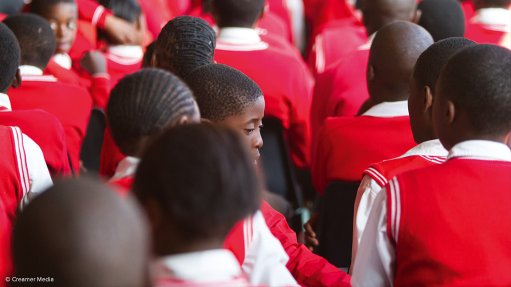Disaster on different continents
It is storms and rain in Cape Town.
I have been in countries where natu- ral disasters have occurred and have been reported on television (okay, clever clogs, they have been reported on radio, in newspapers, on the Internet and by word-of-mouth at the local pub but, in this column . . . television).
News of a local disaster should be presented in much the same way, continent to continent. But it is not, as can be demonstrated by example. The situation is this: a heavy storm and floods have affected a major city. This is how it is presented on British television. We must bear in mind the ethos of British television. It must present the news as it is, without emotion. It must show no panic. The people coped with the blitz, they will cope with this. There must be a demonstration of integration of the people.
Thus, there is a formula which goes like this: (a) Give an overview of the situation (b) Have an interview with Responsible Person Who is Calmly In Charge (c) Cut to person on the scene and (d) Interview with not so responsible person in charge (e) Predict the future. All ready? Here it goes: Newsreader (in a voice as flat and as dry as a salt pan): “Following last night’s storm there are reports of rivers reaching maximum flood levels and in some cases overflowing containment berms. Evacuation has been considered for a number of people in addition to those already been evacuated following high water levels in low-lying areas. Major Hammersmith-Cufflink is in charge of emergency control and evacuation measures.”
Cut to Major H-Cufflink (accent just a bit South London, good bloke promoted in the field): “Ah, yes, thank you. At this time, now, we feel we have the matter under control. We have diversion weirs and no person is currently in danger. We have helicopters standing by in case of emergency evacuation and we will review the situation tomorrow. Ah, thank you.”
Now cut to person on the scene, who, at this level of reporting, can be a recent immigrant: “Yea, right, yea in ‘ammersmith th’ water seems to ‘ave stabilised, yea, not risin’ as fast, th’ army ‘as it under comtrol, we think. Bit cold.” (Note this – the accent is 100% British, immigrant or not.)
And then the summary from Ms Flat and Dry: “It seems that flooding is now under control. More news as it happens.”
Then the Republic of Congo during a flood. I watched a French TV station. The reporting largely followed the British formula. But a difference. Newsreader (think of a younger Isabelle Adjani): “Good evening. It iz reporterd a small catastrophe ‘as occur in La Republique de Congo, the main river is flooding et en suite, now, from local Officer of the Army . . .” (she gives a dazzling smile), and cut to Army Officer (Jean Louis Trintignant look-alike): “Yes (he winks) merci Isabelle, the river is rising, can you believe? Rainfall responsible, you understand. But, uh, we’ve got it under control, you know? Not difficult, provided you are well trained. Our air force is on standby . . . our navy stands ready. We, the army, as you can see, well trained, was first here. No danger. Thank you (smiles to Isabelle).”
Then they cut (as per formula) to a local, who speaks with the clear diction of a Zimbabwean tobacco auctioneer . . . and is incomprehensible.
And finally (no, not South Africa, you can listen for real), the US in the South. Newsreader: “Hi there, I’m Ethel-May Johnson, and here we’all have rahports of the Buffalo Spring river abaht ta busrt its banks . . . here’s Captn Wilmot of the Mississipi Stae Patrol, Capn Wilmot?” Captain Wilmot: “Ah yah Ethel-May . . . ah, wudn’t say its abaht ta busrt its banks . . . the Buffalo has lived up ter it’s name allright, rising faster than a turkey runs at thanksgiving. Ah would say . . . burtsin’ is ah, waal, immanant . . . Waal, we’ll see. Not the first time won’ be th’ laast. Gonna be a site ta see.”
No time for the southern local. But, oh, it is fun.
Article Enquiry
Email Article
Save Article
Feedback
To advertise email advertising@creamermedia.co.za or click here
Comments
Press Office
Announcements
What's On
Subscribe to improve your user experience...
Option 1 (equivalent of R125 a month):
Receive a weekly copy of Creamer Media's Engineering News & Mining Weekly magazine
(print copy for those in South Africa and e-magazine for those outside of South Africa)
Receive daily email newsletters
Access to full search results
Access archive of magazine back copies
Access to Projects in Progress
Access to ONE Research Report of your choice in PDF format
Option 2 (equivalent of R375 a month):
All benefits from Option 1
PLUS
Access to Creamer Media's Research Channel Africa for ALL Research Reports, in PDF format, on various industrial and mining sectors
including Electricity; Water; Energy Transition; Hydrogen; Roads, Rail and Ports; Coal; Gold; Platinum; Battery Metals; etc.
Already a subscriber?
Forgotten your password?
Receive weekly copy of Creamer Media's Engineering News & Mining Weekly magazine (print copy for those in South Africa and e-magazine for those outside of South Africa)
➕
Recieve daily email newsletters
➕
Access to full search results
➕
Access archive of magazine back copies
➕
Access to Projects in Progress
➕
Access to ONE Research Report of your choice in PDF format
RESEARCH CHANNEL AFRICA
R4500 (equivalent of R375 a month)
SUBSCRIBEAll benefits from Option 1
➕
Access to Creamer Media's Research Channel Africa for ALL Research Reports on various industrial and mining sectors, in PDF format, including on:
Electricity
➕
Water
➕
Energy Transition
➕
Hydrogen
➕
Roads, Rail and Ports
➕
Coal
➕
Gold
➕
Platinum
➕
Battery Metals
➕
etc.
Receive all benefits from Option 1 or Option 2 delivered to numerous people at your company
➕
Multiple User names and Passwords for simultaneous log-ins
➕
Intranet integration access to all in your organisation


















